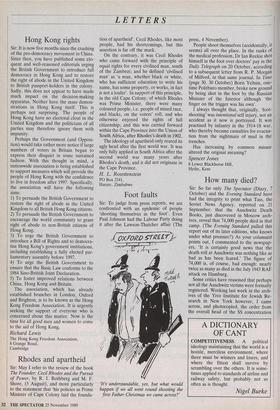Rhodes and apartheid
Sir: May I refer to the review of the book The Founder: Cecil Rhodes and the Pursuit of Power, by R. I. Rothberg and M. F. Shore, (5 August), and more particularly to the statement that 'his policies as Prime Minister of Cape Colony laid the founda- tion of apartheid'. Cecil Rhodes, like most people, had his shortcomings, but this assertion is far off the mark.
On the contrary, it was Cecil Rhodes who came forward with the principle of equal rights for every civilised man, south of the Zambezi; and he defined 'civilised man' as 'a man, whether black or white, who has sufficient education to write his name, has some property, or works, in fact is not a loafer'. In support of this principle, in the old Cape Colony, of which Rhodes was Prime Minister, there were many coloured people, i.e. people of mixed race, and blacks, on the voters' roll, and who otherwise enjoyed the rights of full citizenship; and this was carried forward within the Cape Province into the Union of South Africa, after Rhodes's death in 1902.
The ideology of apartheid only reared its ugly head after the first world war. It was only fully applied in South Africa after the second world war many years after Rhodes's death, and it did not originate in the Cape Province.
H. L. Rosettenstein PO Box 2341, Harare, Zimbabwe










































































 Previous page
Previous page